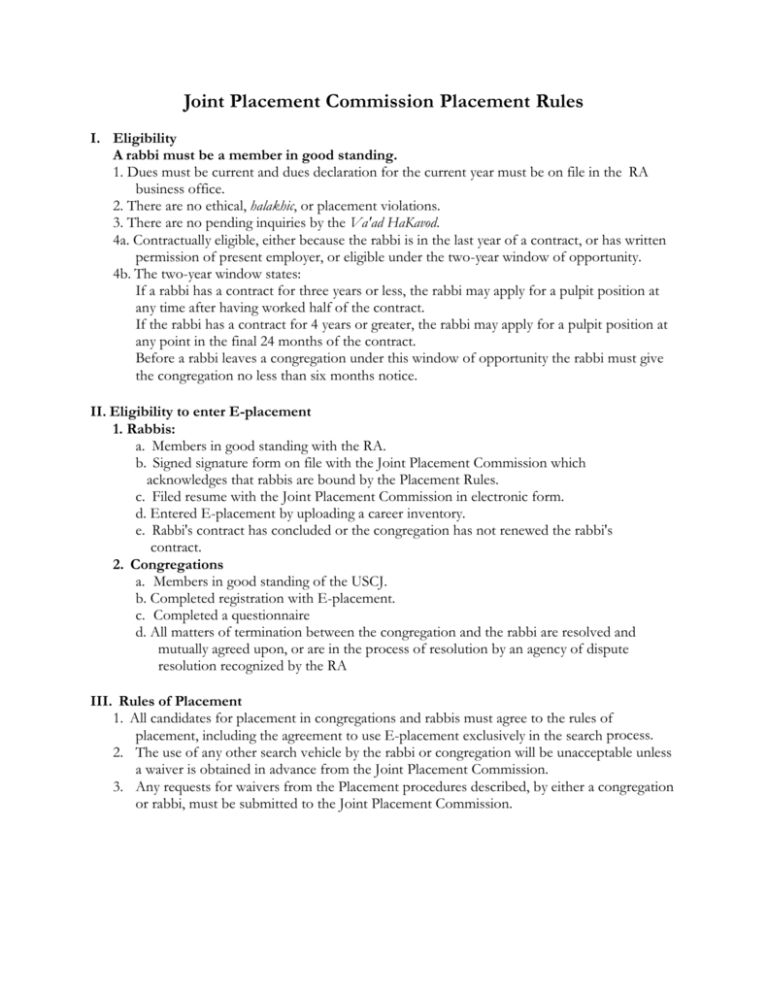Placement Code of Conduct
advertisement

Joint Placement Commission Placement Rules I. Eligibility A rabbi must be a member in good standing. 1. Dues must be current and dues declaration for the current year must be on file in the RA business office. 2. There are no ethical, halakhic, or placement violations. 3. There are no pending inquiries by the Va'ad HaKavod. 4a. Contractually eligible, either because the rabbi is in the last year of a contract, or has written permission of present employer, or eligible under the two-year window of opportunity. 4b. The two-year window states: If a rabbi has a contract for three years or less, the rabbi may apply for a pulpit position at any time after having worked half of the contract. If the rabbi has a contract for 4 years or greater, the rabbi may apply for a pulpit position at any point in the final 24 months of the contract. Before a rabbi leaves a congregation under this window of opportunity the rabbi must give the congregation no less than six months notice. II. Eligibility to enter E-placement 1. Rabbis: a. Members in good standing with the RA. b. Signed signature form on file with the Joint Placement Commission which acknowledges that rabbis are bound by the Placement Rules. c. Filed resume with the Joint Placement Commission in electronic form. d. Entered E-placement by uploading a career inventory. e. Rabbi's contract has concluded or the congregation has not renewed the rabbi's contract. 2. Congregations a. Members in good standing of the USCJ. b. Completed registration with E-placement. c. Completed a questionnaire d. All matters of termination between the congregation and the rabbi are resolved and mutually agreed upon, or are in the process of resolution by an agency of dispute resolution recognized by the RA III. Rules of Placement 1. All candidates for placement in congregations and rabbis must agree to the rules of placement, including the agreement to use E-placement exclusively in the search process. 2. The use of any other search vehicle by the rabbi or congregation will be unacceptable unless a waiver is obtained in advance from the Joint Placement Commission. 3. Any requests for waivers from the Placement procedures described, by either a congregation or rabbi, must be submitted to the Joint Placement Commission. IV. Seniority Category Congregational Size Current Year of Service Required to Apply to Congregation Year of Service Commencing When Rabbi Assumes the Pulpit AA Assistant Rabbi Ordination pending Commencing first year of service (Newly ordained) A Up to 250 Ordination pending Commencing first year of service (Newly ordained) B 251-500 Currently in the second year of service Commencing third year of service C 501-750 Currently in the fourth year of service Commencing fifth year of service D Over 750 Currently in the ninth year of service Commencing tenth year of service In category D, an Assistant Rabbi, after completing six years of service in his/her congregation, will be eligible to assume the Senior Rabbi position. V. Graduating Students Graduating students, in order to be in placement, must have completed all requirements of his/her ordaining institution and completed all of the following requirements. 1. Resume filed with the Joint Placement Commission in electronic form. 2. Entered E-placement by uploading a career inventory. 3. Signed signature form on file with the Joint Placement Commission which acknowledges that rabbis are bound by the Placement Rules. 4. Returned a signed membership application. VI. Special Placements: 1. Assistants a. All assistant positions must be listed with the RA. b. Assistants cannot automatically become senior rabbis of the congregations they are currently serving. They must go through the proper placement procedures including seniority requirements. 2. Interim a. Interim period extends only for 1 year b. An Interim rabbi agrees that he/she cannot be a candidate for the full-time permanent position 3. New congregations a. Any rabbi wishing to start, create, or develop a congregation (defined as any community of worshippers) must receive permission from the JPC, whether or not there is remuneration involved. Note: The following governs the relationship between the Joint Placement Commission, the Rabbi and the Congregation: 1. Neither the Joint Placement Commission nor the International Placement Office may be party to a contract between a congregation and a rabbi and are to be held harmless for any claims arising from such a contract. In the case of a contract dispute between the congregation and the rabbi, the Placement Commission's function is only to give guidance and counsel. 2. Rabbis and congregations participating in any matter before or with the Joint Placement Commission or the International Office of the RA acknowledge by their participation that neither the Joint Placement Commission nor the International Office owe any duty of care or fiduciary responsibility to the rabbi or the congregation.




